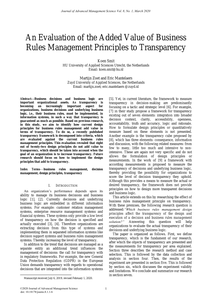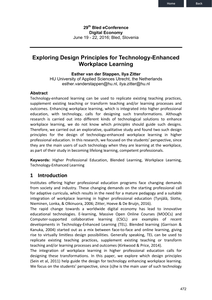Developing students’ information problem solving (IPS) competence in higher education is imperative. However, existing theoretical frameworks describe IPS learning outcomes without guiding effective learning environment design. This systematic review and meta-analysis synthesized empirical evidence to formulate design principles for developing IPS competence. A systematic search across seven academic databases yielded 69 peer-reviewed articles from 2000–2023 with controlled pretest-posttest designs targeting (under)graduate students. Analysis of these studies yielded seven design principles: learning task, instruction, modeling, practice, learning activities, support, and feedback, with meta-analyses validating key relationships. The IPS educational design principles (IPS-EDP) model summarizes how these principles address learning outcomes, teaching and learning activities, and assessment strategies. While our review covered all IPS components, empirical evidence predominantly addressed information search and selection,
MULTIFILE
Developing students’ information problemsolving (IPS) competence in higher education is imperative. However, existing theoretical frameworks describe IPS learning outcomes without guiding effective learning environment design. This systematic review and meta-analysis synthesized empirical evidence to formulate design principles for developing IPS competence. A systematic search across seven academic databases yielded 69 peer-reviewed articles from 2000–2023 with controlled pretest-posttest designs targeting (under)graduate students. Analysis of these studies yielded seven design principles: learning task, instruction, modeling, practice, learning activities, support, and feedback, with meta-analyses validating key relationships. The IPS educational design principles (IPS-EDP) model summarizes how these principles address learning outcomes, teaching and learning activities, and assessment strategies. While our review covered all IPS components, empirical evidence predominantly addressed information search and selection, potentially limiting generalizability to broader IPS competence. The IPSEDP model provides a theoretical foundation for investigating and designing effective IPS learning environments in higher education, bridging research and practice.
LINK
Societal transitions require activities of multiple stakeholders on different systemic levels. Designers and design researchers are often involved in supporting specific interventions and sometimes in enabling and facilitating entire processes. Practices and literature in ‘co-creation ecosystems’ are a developing field for them to discuss differences and relatedness of micro-, meso- and macro perspectives. Using the case of a three-year multi-stakeholder co-creation project in the retail industry, the paper analyses processes and principles for making impact in design-led transition projects. A transition process with three phases is constructed and four principles for making impact at the various levels were found. Comparing findings with the UK Design Council’s ‘Systemic Design Framework’, the paper suggests process adaptations to scale between the local and the sector/national level. It also contributes to a better understanding of systemic design principles like Leadership, Storytelling and Systems Thinking. LinkedIn: https://www.linkedin.com/in/christine-de-lille-8039372/?originalSubdomain=nl https://www.linkedin.com/in/overdiek12345/
DOCUMENT

Business decisions and business logic are important organizational assets. As transparency is becoming an increasingly important aspect for organizations, business decisions and underlying business logic, i.e., their business rules, must be implemented, in information systems, in such a way that transparency is guaranteed as much as possible. Based on previous research, in this study, we aim to identify how current design principles for business rules management add value in terms of transparency. To do so, a recently published transparency framework is decomposed into criteria, which are evaluated against the current business rules management principles. This evaluation revealed that eight out of twenty-two design principles do not add value to transparency, which should be taken into account when the goal of an organization is to increase transparency. Future research should focus on how to implement the design principles that add to transparency.
DOCUMENT

This paper discusses two studies - the one in a business context, the other in a university context - carried out with expert educational designers. The studies aimed to determine the priorities experts claim to employ when designing competence-based learning environments. Designers in both contexts agree almost completely on principles they feel are important. Both groups emphasized that one should start a design enterprise from the needs of the learners, instead of the content structure of the learning domain. However, unlike business designers, university designers find it extremely important to consider alternative solutions during the whole design process. University designers also say that they focus more on project plan and desired characteristics of the instructional blueprint whereas business designers report being more client-oriented, stressing the importance of "buying in" the client early in the process.
DOCUMENT

Biomimicry education is grounded in a set of natural design principles common to every known lifeform on Earth. These Life’s Principles (LPs) (cc Biomimicry 3.8), provide guidelines for emulating sustainable strategies that are field-tested over nearly four billion years of evolution. This study evaluates an exercise for teaching LPs to interdisciplinary students at three universities, Arizona State University (ASU) in Phoenix, Arizona (USA), College of Charleston (CofC) in Charleston, South Carolina (USA) and The Hague University of Applied Sciences (THUAS) in The Hague (The Netherlands) during the spring 2021 semester. Students researched examples of both biological organisms and human designs exhibiting the LPs. We gauged the effectiveness of the exercise through a common rubric and a survey to discover ways to improve instruction and student understanding. Increased student success was found to be directly linked to introducing the LPs with illustrative examples, assigning an active search for examples as part of the exercise, and utilizing direct assessment feedback loops. Requiring students to highlight the specific terms of the LP sub-principles in each example is a suggested improvement to the instructions and rubric. An iterative, face-to-face, discussion-based teaching and learning approach helps overcome minor misunderstandings. Reiterating the LPs throughout the semester with opportunities for application will highlight the potential for incorporating LPs into students’ future sustainable design process. Stevens LL, Fehler M, Bidwell D, Singhal A, Baumeister D. Building from the Bottom Up: A Closer Look into the Teaching and Learning of Life’s Principles in Biomimicry Design Thinking Courses. Biomimetics. 2022; 7(1):25. https://doi.org/10.3390/biomimetics7010025
DOCUMENT

Using language adequately within technology tasks is part of technological literacy. However, this can be challenging for students, and a teacher may need to help students to master aspects of domain specific language that matter for the task at hand. In this study, a curricular design was developed through a series of trials, with the aim to arrive at general principles for a pedagogy that helps students to write about an engineering (electronics) design. The curricular design was theoretically anchored in ‘genre pedagogy’. The interventions were carried out by one experienced teacher in one course, during three consecutive cycles of trialling and improving the curricular design. The resulting design principles for teaching to write about (engineering) design are concerned with: a relevant, complete and feasible focus on language; scaffolding the writing process; procedures for teacher support. For each of these, specifications are described.
DOCUMENT
From the article: "Abstract, technology-enhanced learning can be used to replicate existing teaching practices, supplement existing teaching or transform teaching and/or learning process and outcomes. Enhancing workplace learning, which is integrated into higher professional education, with technology, calls for designing such transformations. Although research is carried out into different kinds of technological solutions to enhance workplace learning, we do not know which principles should guide such designs. Therefore, we carried out an explorative, qualitative study and found two such design principles for the design of technology-enhanced workplace learning in higher professional education. In this research, we focused on the students' perspective, since they are the main users of such technology when they are learning at the workplace, as part of their study in becoming lifelong learning, competent professionals."
DOCUMENT

Biomimicry is an emerging discipline that seeks nature’s advice and brings diverse stakeholders together to create designs that emulate the way nature functions, not just the way it looks. The field itself is a multidisciplinary endeavor, yet biomimicry educators frequently work alone. Pedagogical methods based on trial and error may waste precious time. In this study, a set of four biomimicry experts from diverse disciplines and different areas around the globe collaborated to compare pedagogy and analyze student work to illuminate best principles for teaching students to translate biology into design solutions, a key step in the biomimicry design process. A total of 313 assignments created by 179 different students were evaluated. The results showed that the inclusion of art in the learning of science, namely the hand drawing of the biological mechanism can lead to higher quality of abstracted design principles. Stevens, L., Bidwell, D., Fehler, M., Singhal, A. (2022). The Art and Science of Biomimicry—Abstracting Design Principles from Nature. In: Rezaei, N. (eds) Transdisciplinarity. Integrated Science, vol 5. Springer, Cham. https://doi-org.ezproxy.hhs.nl/10.1007/978-3-030-94651-7_29
DOCUMENT

Students who experience high well-being are better able to developthemselvesand performwithin their educational program. Personal resources can be developed with interventions and more developed personal resources can contribute to well-being. However, it is not yet sufficiently clear what theseinterventions should look like to be effective. Therefore, this study focuses on formulating design principles for interventions aimed at developing four personal resources of honorsstudents: self-efficacy, optimism, inquiry mindedness, and self-regulation. Data were collectedviafocus groups. Data showed that design principles for interventions to develop those four personal resources differsomewhat, but also have several aspects in common: they combine group and individual activities, students are taught basic skills to help them directing their own development, they have an ongoing character and consist of recurring activities. The design principles can be used to design interventions to enhancehonors students’personal resources. Further research is needed into the design and effects of these interventions and possible generalisationof the design principles to other contexts.
MULTIFILE
